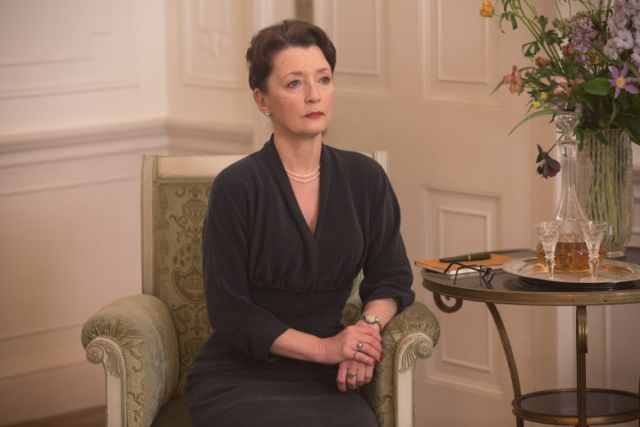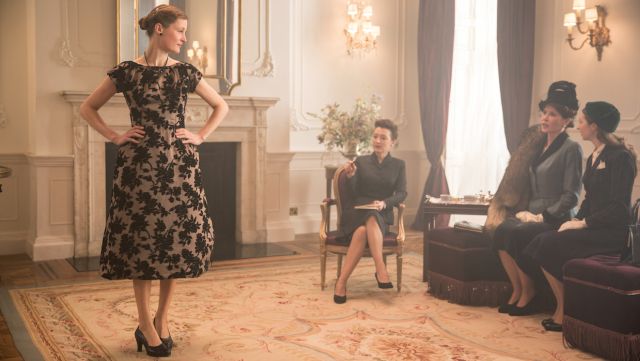A perfectionist says goodbye to an art form he has done so much to nourish by playing – you guessed it – a perfectionist. From the minute Daniel Day-Lewis first appears in Phantom Thread, looking sartorially splendid and more aquiline than ever, there's no doubt that the thrice Oscar-winning actor (and a nominee again this year) owns this movie as he has so many previous ones. Playing the wonderfully named Reynolds Jeremiah Woodcock, a 1950s fashion designer possessed of killer charm and something darker and more unknown as well, the actor cuts a presence at once alluring and somewhat forbidding.
That darkness does indeed fall (not for nothing does Reynolds reference an "air of quiet death in this house") prompts one to look beyond the film's sleek, unsullied surface to the spoilage that shades it at every turn. The movie opens with Day-Lewis getting himself nattily dressed for the day like some period English equivalent of the Gallic lever du roi. And yet this movie is interested less in appearance than in the fraying threads between husband and wife, brother and sister, and between the confident outward face one projects toward the world and the multiple idiosyncrasies, even perversities, that roil deep within the self.  You might, for instance, be forgiven for thinking that the faintly dandified Reynolds would seek a rather more glam partner than the sweetly clumsy Alma (Vicky Krieps, an intriguing Luxembourgeois newcomer), whom he meets when she is his waitress at the country hotel. No ordinary consumer of food – asparagus, we discover, must be served with oil and salt and never with butter – Reynolds doesn't so much court Alma per se as ensnare her in his flickeringly charismatic web.
You might, for instance, be forgiven for thinking that the faintly dandified Reynolds would seek a rather more glam partner than the sweetly clumsy Alma (Vicky Krieps, an intriguing Luxembourgeois newcomer), whom he meets when she is his waitress at the country hotel. No ordinary consumer of food – asparagus, we discover, must be served with oil and salt and never with butter – Reynolds doesn't so much court Alma per se as ensnare her in his flickeringly charismatic web.
Quite what the dynamic will be between the awkward younger woman and an older man who keeps on the payroll a retinue of assistants marked out by military precision generates the abiding suspense of the film, that central relationship complicated by the hovering presence of Reynolds's sister, Cyril (an implacable Lesley Manville, also Oscar-nommed and pictured above), who stalks proceedings with a hawk-like intensity that Mrs Danvers might well envy. (Hitchcockian references abound throughout, not least in the characters' given names: Alma, of course, was the name of Hitch's own wife.)
If this were The Age of Innocence, the Day-Lewis film which Phantom Thread most superficially resembles (Edith Wharton's Newland Archer is a name worthy of Reynolds Woodcock), social satire would prevail. This latest film, indeed, seems briefly to tilt in that direction with the arrival for a fitting or two of Reynolds's titled clientele – among them a cape-wielding countess ripely played by a game Gina McKee. But as the focus narrows towards its three central figures, we seem to be watching a shifting power play that exists in a world of perfect hemlines and precisely made-to-order omelettes where love exists a stitch or two away from hatred and precision topples over into obsession. Those considerations in themselves tally with the near-obsessive intensity that Day-Lewis has famously brought to his work over time, and it's difficult for all the sense of departure in Day-Lewis's performance (playing a Brit, for instance, which he hasn't in years) not to feel that he is here positing as his swansong a study in the psychic mechanism required for excellence that has fueled his own storied career over time. Meticulousness comes, we realise, at a cost.
Those considerations in themselves tally with the near-obsessive intensity that Day-Lewis has famously brought to his work over time, and it's difficult for all the sense of departure in Day-Lewis's performance (playing a Brit, for instance, which he hasn't in years) not to feel that he is here positing as his swansong a study in the psychic mechanism required for excellence that has fueled his own storied career over time. Meticulousness comes, we realise, at a cost.
In a film that has far fewer principal characters than one might expect of something of such scope and length, the two women in Reynolds's orbit are neatly complementary. In an ideal world, Krieps would be getting some of the awards-season interest that has gone her co-stars' way: gentleness and steeliness don't necessarily align, and Krieps shows Alma learning to juggle both on the job, in ways that extend well beyond how to serve the starter. Manville has arguably the easier assignment, and her role doesn't especially evolve much throughout the film. But in the part of Reynolds's "old so-and-so", the veteran actress suggests a force whom one ignores at considerable cost. Remarking "let me be unambiguous", she generates a frisson amid a film alive to ambiguity at every turn. (Pictured above, Krieps and Manville.)
Like the novella that Phantom Thread sometimes feels as if it could have been, the film reveals enough but not too much and backs away from over-explication if the suggestive can linger in the frame instead. It seems fitting near the end that Reynolds is heard to remark "I'm still hungry", as if Day-Lewis himself were wondering whether he really has supped one last time from the acting table. I first came across this actor in his days as a National Theatre company member, first in Dusty Hughes's Russian-themed Futurists and then as the famously scorching Hamlet that led him to call it theatrical quits. As he now prepares to kiss movies goodbye, I would venture a guess that it is we, the audience, who no doubt hoping against hope will hunger for more.















Add comment